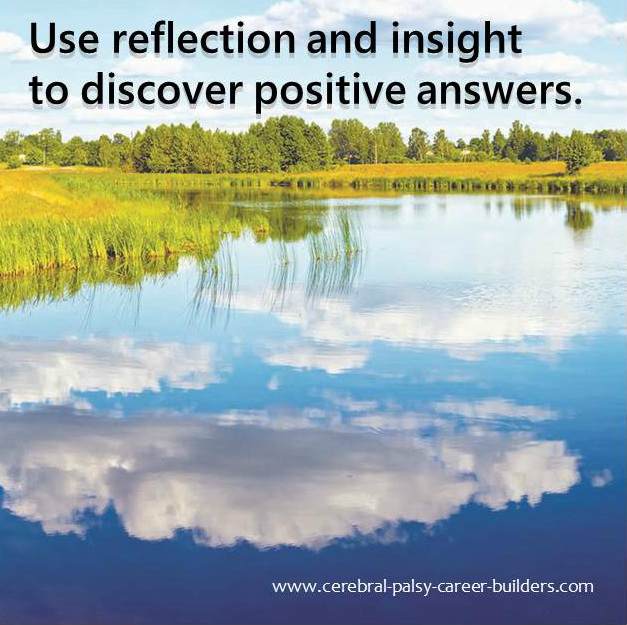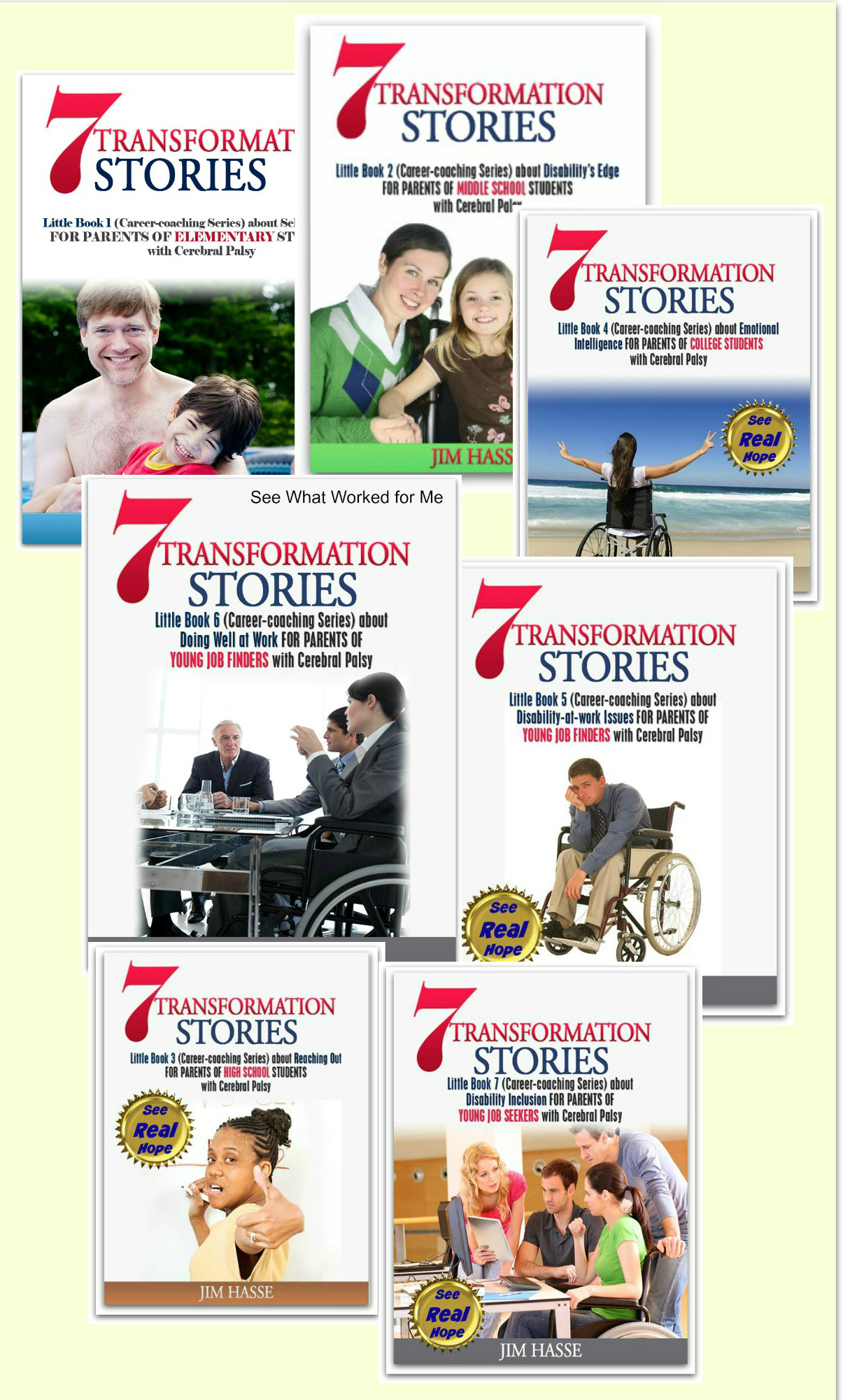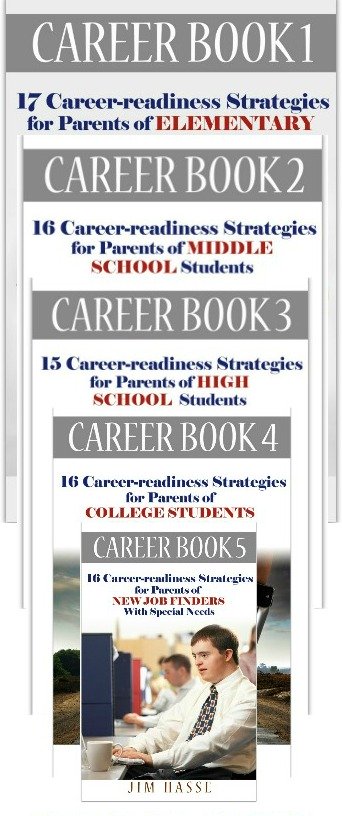Gaining Self Confidence: Cerebral Palsy Career Builder for Job Seekers
By Jim Hasse, ABC, GCDF, Disability Employment Expert
_________________________________________________________
Gaining self confidence is developing a "good answer" to questions hiring managers have (but don't ask) about your disability.
That's a key concept you, as a parent, mentor or coach, need to pass on to your new job seeker with cerebral palsy (CP), who is making the transition from school to work.
A "good answer" to questions about your youngster's CP directly addresses the main issue of his or her disability in the questioner's mind and quickly turns that specific disability's assumed key negative into a positive. It's a process for gaining self confidence during a job search.
It's not easy, and it takes some work, but it's doable.

A "good answer" requires extra effort
At a recent workshop for updating skills in career development facilitation, I heard two individuals who help technical college students with disabilities develop career management skills concur on this observation:
"We don't know where this comes from, but we find students with disabilities generally have some catching up to do (compared to the general student population) when it comes to gaining self confidence and knowing how to sell themselves to employers as viable job candidates."
I was not surprised to hear that lament, but I was surprised to hear two in-the-trenches people actually question why students with disabilities have difficulty "selling themselves" in this age of self-promotion.
After all, turning CP into a positive in the eyes of an employer requires reflection, insight and extra work. But it's one of the keys to gaining self confidence.
Here are a couple of extra questions non-disabled job candidates usually don't have to ask themselves as they develop their job marketing programs:
- "How do I gather enough self-esteem to look at my disability as a strength instead of a weakness?
- "How do I describe that strength in a way that is meaningful to a prospective employer?"
- "How do I get that whole disability issue out of the way first during a job interview so I can then focus on my strengths for the job at hand?"
Tell your new job seeker:
"That kind of preparation for a job hunt is well worth the extra effort. It's part of the process for gaining self confidence, which you've been working on since you've been a child."
The keys to getting it done are introspection, perception and projection. Again, that requires work.
Debra L. Angel and Elizabeth E. Harney are authors of "No One is Unemployable: Creative Solutions for Overcoming Barriers to Employment."
Their responses (in capsule form) to the above questions for your new job seeker:
Develop a "good answer" for a reply to questions about your disability and your ability to do a job; plant it in the back of your mind in case you need to use it -- something short and sweet that comes off the tip of your tongue naturally during a job interview.
What makes a "good answer"?
Ideally, your new job seeker's "good answer" can act as a transition from talking about CP to describing his or her work skills during job interviews so the interviewer can focus instead on what your youngster can offer the company or organization.
How do you answer the question
about the ability of your young job seeker to do a job?
Join PACER’s Facebook
discussion.
To develop a "good answer" to a real and/or perceived disability barrier to employment, the authors first ask a job seeker to consider these two questions:
- "How do you perceive the barrier to your employment?"
- "How do you think the employer perceives that same barrier?"
To find the key to your youngster's "good answer," the authors suggest that both of you (mentor and mentee) search for reasons why the barrier should no longer concern the employer.
Can the barrier be used to further qualify your youngster for a particular job? Or, has overcoming the barrier helped your son or daughter develop skills or knowledge that a prospective employer needs (such as resourcefulness, planning or persistence)?
By personally developing a "good answer," your young job seeker can minimize fear of job interviews and exhibit more self-confidence because he or she will begin to see the whole job search process in a more positive light.
"Good answer" examples
Here are three examples of "good answers" I've collected over the last decade:
First from Mary:
"I have some sight, but I'm legally blind. However, my visual impairment has become more of help than a hindrance to me as an online content editor because I use computer screen magnification and screen reading software to enhance my ability to thoroughly proof text before it goes online. In some instances, I pinpoint typos -- little things in the text that my current supervisor, who is sighted, misses."
Second from Tom:
"I don't drive because of my limited sight, but, under a range of work situations, I've learned how to team up with other workers to carpool. I usually volunteer to keep track of weather and traffic reports each day so we can avoid delays. I often keep track of ride-sharing expenses for the group, too. It's quite easy because I have screen reading software on my laptop, which I often carry with me. These ride-sharing experiences, by the way, have also taught me a lot about team work and group problem solving -- things I can apply when I'm at work."
Third from Bev:
"I'm sure you've noticed that I talk with some difficulty. This has not had an impact on my ability to manage a communication department, however, because I know how to effectively delegate the functions I cannot do well myself to others on my staff who can. In fact, I've found that, by developing my delegating skills and recognizing excellent performance among my staff members, I've been able to develop strong teams and future leaders for my employers."
Each of the three "good answers" above directly addresses the issue of disability and quickly turns a specific disability's assumed key negative into a positive -- and provides a convenient transition into a discussion about what the job candidate can offer the employer in terms of relieving a pain or obtaining a gain.
They are short -- and sweet because they show the job candidate is gaining self confidence by just telling a concrete example of how disability can often be turned into positive force in one's life.
How do you answer the question
about the ability of your young job seeker to do a job?
Join PACER’s Facebook
discussion.
Return from Gaining Self Confidence to Job Finder
Go to Cerebral Palsy Career Builders
This is Creative Commons content. You can freely and legally use, share and repurpose it for non-commercial purposes only, provided you attach this sentence and the following attribution to it (including the two links):
Originally written and illustrated by Jim Hasse, ABC, GCDF, owner of Hasse Communication Counseling, LLC, who, as a person with cerebral palsy, served for 10 years as a vice president in a Fortune 500 company during his 29-year career in corporate communication. He’s an Accredited Business Communicator, certified as a Global Career Development Facilitator and author of 14 Amazon books about disability awareness and disability employment issues.





